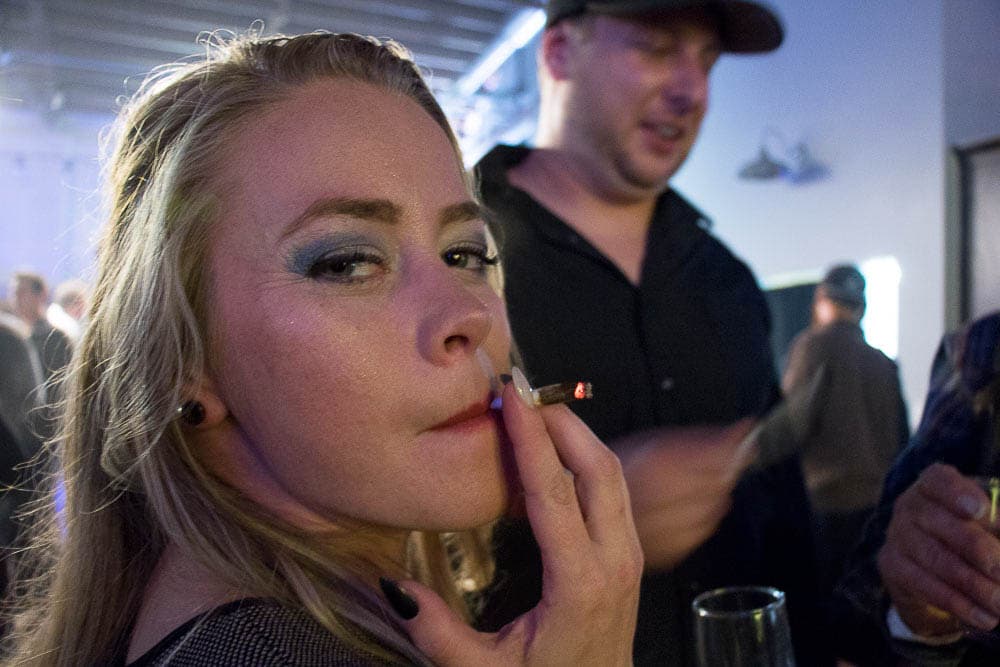
Denver revealed its draft set of rules for social consumption areas Thursday and is giving residents the chance next month to weigh in on them during a public hearing.
You can let the city know who you think should be allowed to create social consumption areas and events, where those spaces should be and what they should look like 5:30 p.m. June 13 during a public hearing at the Webb Municipal Office Building. Those who can't or don't want to attend can also comment on the rules online.
After the public hearing, city officials will finalize the rules and likely start issuing permits for consumption areas and events this summer.
A committee tasked with shaping Initiative 300’s roll-out met several times from January to April to weigh in on what the rules should look like. I-300, in a nutshell, allows just about any kind of business that doesn’t sell marijuana to apply for a cannabis consumption permit under the Neighborhood-Supported Cannabis Consumption Pilot Program. If approved, a business owner can set up space for people to use marijuana in their business.
The Social Consumption Advisory Committee has been hung up on a few points: whether a business should only be available to those 21 and older when people are consuming marijuana, whether vaping marijuana indoors was OK, how far outdoor consumption areas should be from homes and if drinking while consuming would be OK.
The draft rules show that while businesses have to keep underage people out of social consumption areas, their entire property doesn't have to be restricted to those 21 and older. Vaping could be allowed with a ventilation plan. No permits will be issued in any location that is located in a residential zone. Using alcohol in a consumption area is not allowed, and businesses with a liquor license can't serve while people are using marijuana.
The rules released Thursday were "a good initial effort," said Rachel O'Bryan, a committee member and opponent of I-300.
"From my viewpoint, we could put further protections in place of keeping it away from people who are under 21 and further away from homes," O'Bryan said. "Let's remember, this is a pilot program. We will potentially need to modify these rules once we see them in practice, but that’s been our state for the past five years around marijuana. ... We are learning as we go."
Committee member and backer of I-300, Emmett Reistroffer said, "generally speaking, we're just excited the program is moving forward, and we hope permits will be issued by this summer."
"However, we going to challenge some of the proposed rules that we think undermine the intent of the initiative and could propose some serious burdens to businesses and their consumers," he said.
Reistroffer said his group has been seeking legal advice and his issues with the city's proposed rules failing to treat cannabis similarly to alcohol. For example, the rules require adults entering cannabis consumption areas to sign a waiver acknowledging they're about to enter an area where people are consuming marijuana.
"Why should adults have to sign an acknowledgment form every time they enter an area where cannabis consumption is allowed, when such a requirement would be unthinkable when it comes to venues that allow alcohol consumption?" Reistroffer said in a statement.
The statement went on to say:
Why should cannabis consumption areas need to be located twice as far away from public recreation centers and childcare facilities as bars and other venues that serve alcohol? Why should cannabis consumption be prohibited on a rooftop deck solely because it is visible to someone standing on the roof of an adjacent building? The goal of Initiative 300 was to end the unfair treatment of cannabis consumers, but some of the proposed rules reinforce the stigma it was intended to break. Prohibiting liquor-licensed establishments from allowing cannabis consumption areas disqualifies virtually every entertainment venue in town. These unnecessary and overly burdensome rules will deter businesses from seeking permits, in which case consumption will continue to take place in non-permitted areas. If permitted cannabis consumption areas are not allowed inside these businesses, the city will have to deal with it taking place outside on the streets and in the alleys surrounding them.
It remains unclear what action, if any, Denver City Council will take on social consumption areas. The council can start creating rules of its own around the Neighborhood-Supported Cannabis Consumption Pilot Program starting in May. Those rules could make getting permits easier or more difficult by trumping what Excise and Licenses puts out.
This article has been updated from an earlier verision to include the statement from proponents if Iniative 300.
Subscribe to Denverite’s newsletter here.
Business & data reporter Adrian D. Garcia can be reached via email at [email protected] or @adriandgarcia on Twitter.












